Peek into the lineage of Jacob in the Bible to uncover how his descendants shaped history and religion, leaving you eager to learn more.
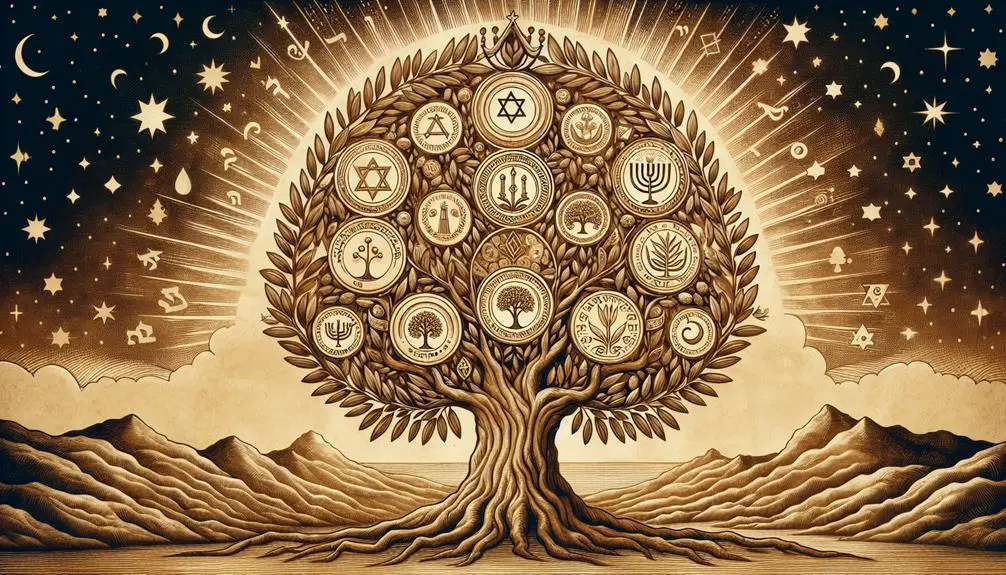
Lineage of Jacob in the Bible
Just as a tree is known by its fruit, so too is the biblical figure Jacob recognized by his descendants. You might recall Jacob's journey, one fraught with deceit, dreams, and the divine, but it's his lineage that has left an indelible mark on history.
As the father of the twelve tribes of Israel, his story is more than a mere family tree; it's a narrative that weaves through the fabric of several religions and cultures. But which of his children played pivotal roles beyond the well-told tales of Joseph and Benjamin?
Uncovering this might shed new light on ancient stories, revealing layers you've yet to consider.
Key Takeaways
- Jacob's lineage, through his sons, forms the Twelve Tribes of Israel, each with a unique role and identity.
- Divine interventions and familial dynamics significantly influenced the narratives and destinies within Jacob's family.
- Women in Jacob's lineage, notably Leah, Rachel, Bilhah, and Zilpah, played crucial roles in shaping the nation of Israel.
- Joseph and Benjamin's stories highlight themes of providence, forgiveness, and the importance of family unity and identity.
Jacob's Early Life and Family

Delving into Jacob's early life and family reveals a complex narrative, where his birth as the younger twin to Esau sets the stage for pivotal events that shape not only his destiny but also the fabric of biblical history. This inception of Esau's rivalry with Jacob isn't merely fraternal competition but a divinely influenced struggle with far-reaching consequences. This rivalry, deeply ingrained from birth, foreshadows Jacob's future challenges and triumphs.
Jacob's life is characterized by divine encounters that guide and redefine his path. These moments aren't random; they're intricately connected to his initial relationship with Esau and their contrasting destinies. The first of these encounters, the purchase of Esau's birthright for a mere pottage, highlights Jacob's cunning and foreshadows the strategic maneuvers that define his life. This act, driven by opportunity and desperation, sets a precedent for Jacob's complex relationship with morality, divine will, and his own ambition.
Jacob's early experiences, marked by family dynamics and celestial intervention, thus lay a foundation for understanding his role in biblical history. They underscore the intertwined nature of personal ambition, divine encounters, and familial relationships, framing the narrative of a man whose life is as much about his flaws and redemption as it's about fulfilling a divine legacy.
The Birth of the Twelve Sons
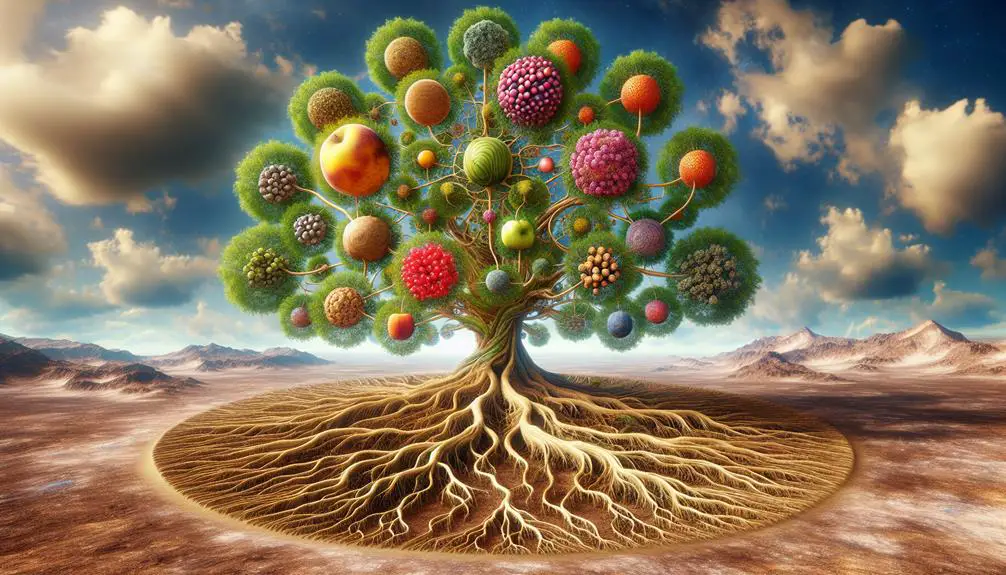
As we explore further into Jacob's life, the birth of his twelve sons emerges as a pivotal development, shaping the future of the Israelite tribes and encapsulating his legacy within biblical narratives. This moment isn't merely a historical or familial recording; it's imbued with deep patriarchal symbolism and rich naming traditions that reflect both divine providence and human aspirations.
- Patriarchal Symbolism: Each son represents not only a tribe but a facet of Jacob's inheritance and God's promises. Their births and the circumstances surrounding them are symbolic narratives, intertwining divine intent with human action.
- Naming Traditions: The names given to Jacob's sons are loaded with meaning, often reflecting the emotional state or aspirations of their mothers. These names serve as prophetic markers and a testament to the lived experiences of their bearers.
- Leah and Rachel's Contributions: The rivalry between Leah and Rachel, Jacob's wives, plays a crucial role. Their competition for Jacob's affection inadvertently shapes the emerging Israelite nation, highlighting the complex interplay between divine plans and human desires.
- Bilhah and Zilpah's Roles: The inclusion of sons born to Jacob through Bilhah and Zilpah, the maidservants, underscores themes of surrogacy and societal norms within ancient patriarchal systems, further enriching the tapestry of Israel's foundational narrative.
Significance of Joseph's Story
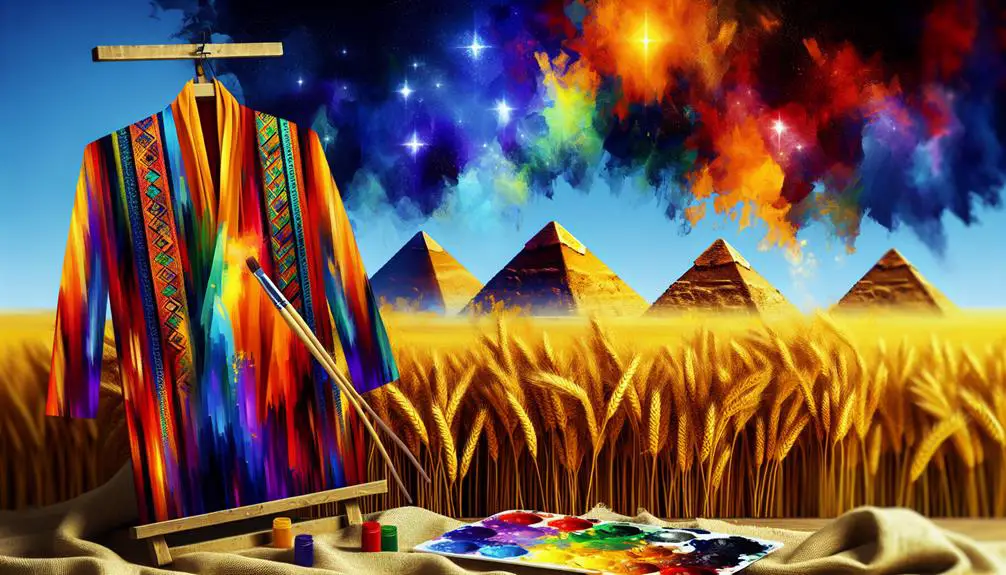
Within the intricate tapestry of Jacob's lineage, Joseph's narrative stands out, not only for its dramatic depth but also for its profound implications on the evolution of the Israelite identity and its theological underpinnings. You'll find that Joseph's story, rich with themes of betrayal, redemption, and divine providence, offers a critical lens through which to view the unfolding of biblical history.
Joseph's adeptness at dream interpretation plays a pivotal role, not just in his personal ascent from slave to vizier in Egypt, but also in the survival of his family and, by extension, the nascent Israelite nation during Egypt's famine. This skill, seen as a direct communication with the divine, elevates Joseph's status and exemplifies the theme of God's guidance in the lives of His chosen.
Key Element |
Significance |
|---|---|
Dream Interpretation |
Demonstrates Joseph's divine connection and wisdom. |
Egypt's Famine |
Serves as the backdrop for Joseph's reunification with his family, highlighting themes of forgiveness and divine providence. |
Joseph's story, therefore, isn't just a narrative of personal triumph; it's a foundational tale that illustrates the broader theme of survival and identity formation for the Israelite people. Through his journey, you're invited to reflect on the dynamics of faith, foresight, and forgiveness, underpinning the Israelites' story.
The Role of Benjamin
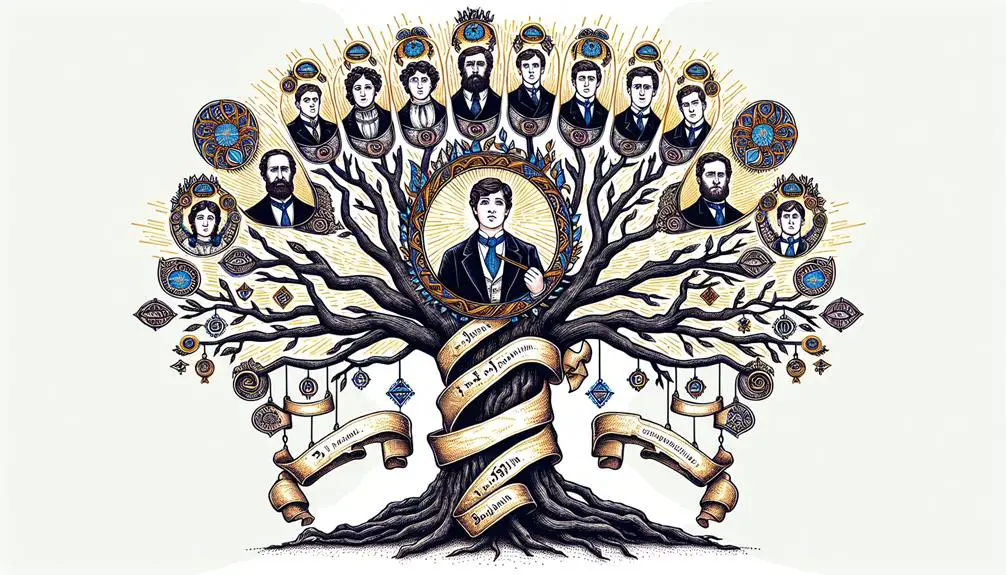
Benjamin, the youngest son of Jacob, plays a pivotal role in the biblical narrative, serving as a key figure in the unfolding drama between Joseph and his brothers. His story isn't just a familial tale but also intertwines significantly with the broader historical and theological themes of the Bible. Here are four critical aspects to consider regarding Benjamin's role:
- Bridge in Joseph's Reconciliation: Benjamin's presence becomes a catalyst for Joseph's emotional disclosure to his brothers in Egypt, highlighting themes of forgiveness and divine providence.
- Benjamin's Territory: Post-Exodus, the tribe of Benjamin is allocated a strategic piece of land between Judah and Ephraim. This placement isn't only geographically significant but also symbolizes Benjamin's role as a connector within the nation of Israel.
- Saul's Lineage: Benjamin's significance is further underscored through Saul, Israel's first king, who hails from this tribe. This connection between a founding monarch and Jacob's youngest son elevates Benjamin's status within the biblical narrative.
- Symbol of Unity and Division: The tribe of Benjamin plays complex roles in Israel's history, at times symbolizing unity, while at others, deep division within the nation.
Benjamin's multifaceted role within the biblical narrative showcases his importance beyond just the familial drama with Joseph, extending into the historical and theological realms of Israel's story.
Jacob's Daughters
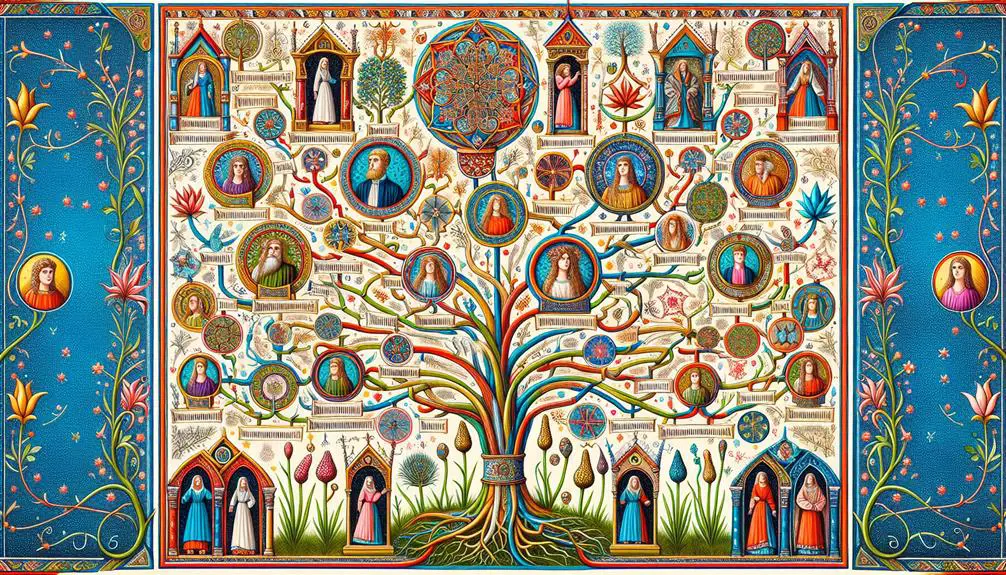
You must consider the narratives surrounding Jacob's daughters within the broader context of Biblical genealogy to appreciate their significance.
While Dinah's story is notably documented for its dramatic and societal implications, the accounts of Jacob's lesser-known daughters also contribute to our understanding of familial and cultural dynamics in ancient times.
These narratives offer a nuanced perspective on the roles and recognition of women in Biblical history, illuminating their contributions and challenges within a patriarchal society.
Dinah's Unique Story
Among Jacob's children, Dinah's story stands out as a singular narrative that emphasizes the complex dynamics of honor, family, and societal norms in ancient biblical times. You'll find that her tale sheds light on:
- Gender Dynamics: Dinah's experience highlights the stark gender inequalities and expectations placed upon women in her time.
- Ancient Customs: Her story is deeply intertwined with the practices and laws that governed personal and communal life, offering a window into the past.
- Family Honor: The repercussions of her encounter underscore the weight of family honor and its implications for familial relationships.
- Societal Norms: It exposes the societal norms that dictated responses to personal and familial offenses, revealing the intricate web of social expectations.
Through Dinah, you glimpse the intricate interplay between individual lives and the broader societal and familial structures of ancient times.
Lesser-Known Daughters
While Dinah's story captures significant attention for its depth and complexity, Jacob's lineage also includes lesser-known daughters whose narratives offer further insight into the fabric of ancient biblical society. These daughters, often overshadowed by their brothers, have their own unique roles that contribute to the genealogical impact of Jacob's family.
Their existence, though sparingly documented, challenges the conventional cultural depiction of biblical women as mere background figures. By analyzing the scant references to these women, you uncover a nuanced understanding of their contributions to their family's legacy. Such an exploration reveals the complex dynamics of inheritance, identity, and the societal positioning of women in ancient texts.
These daughters, in their obscurity, add depth to our understanding of biblical genealogy and cultural norms.
The Twelve Tribes of Israel
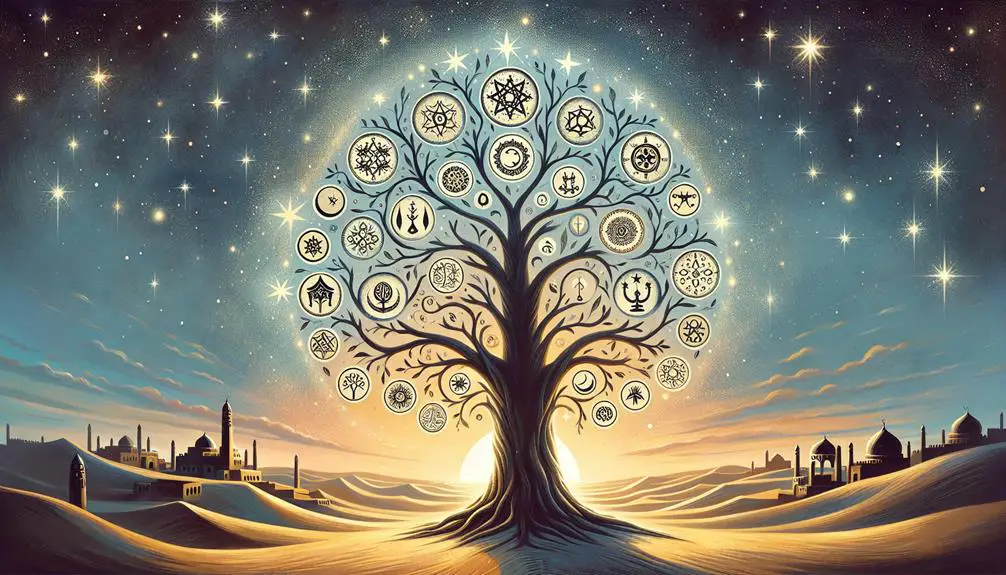
You'll find that the origins of the Twelve Tribes of Israel are deeply rooted in the narratives of Jacob's descendants, each tribe emerging with a distinct identity and purpose within the broader context of Israelite society.
An exploration into these tribal origins reveals a complex web of familial, social, and theological dynamics that shaped the nation's history. Additionally, understanding the significant roles these tribes played, both individually and collectively, offers critical insights into the socio-political and religious evolution of ancient Israel.
Tribal Origins Overview
The formation of the Twelve Tribes of Israel represents a fundamental aspect of biblical history, tracing back to the sons and grandsons of Jacob. This complex lineage laid the groundwork for significant tribal migrations and cultural impacts that have reverberated through history.
To understand their origins, consider the following:
- Tribal Migrations: The movements across territories shaped their socio-political structures.
- Cultural Impacts: Their traditions and laws influenced surrounding civilizations.
- Patriarchal Lineage: Each tribe originates from one of Jacob's sons or grandsons, embedding a deep familial connection.
- Territorial Claims: Their ancestral lands were divided according to divine promises, affecting regional dynamics.
Analyzing these aspects offers a nuanced insight into the tribal genesis, underscoring their pivotal role in shaping biblical narratives and historical trajectories.
Significant Tribal Roles
Each of the Twelve Tribes of Israel played a unique and pivotal role in shaping the cultural, religious, and political landscape of the biblical era.
Tribe |
Role |
|---|---|
Judah |
Emerged as a political powerhouse, leading to kingship and governance, pivotal in tribal conflicts. |
Levi |
Dedicated to religious services, maintaining the temple and spiritual practices. |
Zebulun |
Known for their economic contributions, excelling in trade and seafaring activities. |
These roles underscored the complex interplay between the tribes. Judah's ascendancy often led to political dominance, influencing the course of biblical history significantly. Levi's spiritual stewardship fostered a unifying religious identity. Meanwhile, Zebulun's economic prowess facilitated trade, enriching not just their tribe but also contributing to the prosperity of the nation as a whole.
Legacy and Influence on Religions
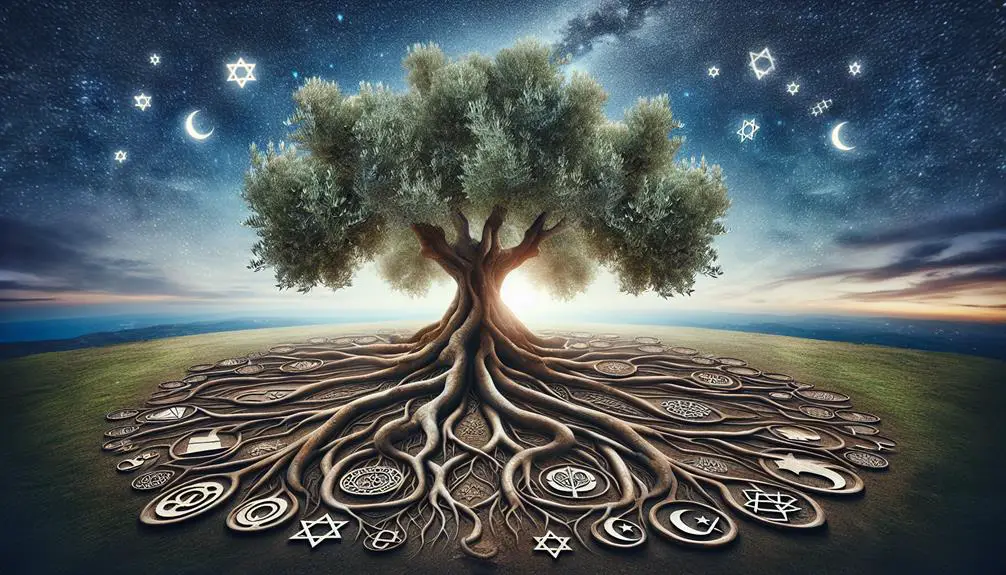
Jacob's lineage, deeply rooted in the foundational texts of Judaism, Christianity, and Islam, significantly shapes the theological and cultural landscapes of these religions. His story and descendants not only provide a common historical and spiritual ancestry but also facilitate interfaith dialogue and enrich cultural representations across diverse communities.
Here's how Jacob's legacy influences these major world religions:
- Interfaith Dialogue: Jacob's narrative serves as a bridge for discussion among Judaism, Christianity, and Islam. His life and the promises made to him are recognized and revered across these faiths, offering a shared foundation for mutual understanding and respect.
- Cultural Representations: Art, literature, and music across centuries have drawn from Jacob's life, showcasing his influence on cultural expressions. His struggles, dreams, and encounters with the divine inspire artists, writers, and composers, reflecting his enduring presence in religious and secular works.
- Theological Foundations: His covenant with God forms a pivotal moment in scriptural narratives, shaping theological perspectives and doctrines. This covenant is interpreted in various ways, influencing religious teachings and practices.
- Ethical and Moral Lessons: Jacob's life, marked by both flaws and faithfulness, provides valuable lessons on ethics, morality, and personal transformation, deeply impacting religious education and moral discourse.
Frequently Asked Questions
How Did Jacob's Relationship With His Brother Esau Evolve After Jacob Acquired the Birthright and Blessing?
After acquiring the birthright and blessing, you'd expect Jacob and Esau's sibling rivalry to escalate. Surprisingly, their relationship undergoes a profound reconciliation process.
Initially, Esau's fury suggests a permanent rift, but time and distance allow for reflection and healing. When they finally reunite, the emotional encounter, marked by embraces and tears, signifies a deep, reconciled bond.
This transformation underscores the complexity of sibling dynamics and the powerful capacity for forgiveness and change.
Are There Any Archaeological or Historical Evidences That Corroborate the Existence of Jacob and His Lineage?
You're diving into whether there's tangible evidence for Jacob's existence. Surprisingly, direct archaeological proof is scarce. However, Jacob's tomb, considered a historical site, aligns with the Patriarchal narratives, offering a tangible link to these ancient stories.
While scholarly debate continues, the absence of concrete evidence doesn't negate the possibility of Jacob's historical presence. Rather, it invites a deeper analysis of how history and faith intersect, emphasizing the complexity of uncovering our past.
How Does the Islamic Tradition Interpret and Represent Jacob and His Lineage Differently From the Judeo-Christian Texts?
In Islamic tradition, Jacob's Prophethood is emphasized, showcasing his spiritual significance and leadership. This contrasts with the Judeo-Christian texts that focus on his lineage and personal struggles.
Esau's portrayal also diverges in Islamic texts. While the Judeo-Christian narrative often paints him in a contentious light with Jacob, Islamic texts present a more reconciled relationship.
This nuanced interpretation offers a distinct perspective, enriching our understanding of these historical figures beyond their familial ties.
In What Ways Have Modern Genetic Studies Attempted to Trace the Descendants of the Twelve Tribes of Israel, if Any?
Curious about your roots? Modern genetic studies have dived deep into ethnic genetics and population studies, aiming to uncover connections to the ancient tribes. Researchers employ DNA analysis, tracing genetic markers across populations, and comparing them to historical migrations and known demographic patterns.
Their work sheds light on the complex tapestry of human ancestry, offering insights into how closely we're linked to historical populations, possibly even the twelve tribes themselves.
What Are the Lesser-Known Myths or Folklore Within Jewish Tradition That Involve Jacob but Are Not Commonly Discussed in Religious Texts?
You might find it fascinating to explore lesser-known tales that swirl around Jacob, beyond the widely recognized stories.
Two intriguing examples include the myth of Jacob's ladder and the enigmatic account of his wrestling with an angel.
These narratives, though not always spotlighted in mainstream discussions, offer rich layers of symbolism and moral lessons.
They're ripe for analysis, shedding light on the complexity of Jacob's character and his spiritual journey.
Conclusion
In your exploration of Jacob's lineage, you've traversed from the intimate tales of his offspring to the grandiose legacy of the Twelve Tribes.
This journey isn't just about ancient narratives; it's a reflection on the profound interplay between personal narratives and collective destiny.
Analyzing Joseph's trials alongside Benjamin's significance, or juxtaposing the mention of daughters against the sons, reveals a complex fabric of identity and spirituality.
Jacob's story, thus, becomes a scholarly tapestry, weaving individual fates into a broader religious and cultural paradigm.

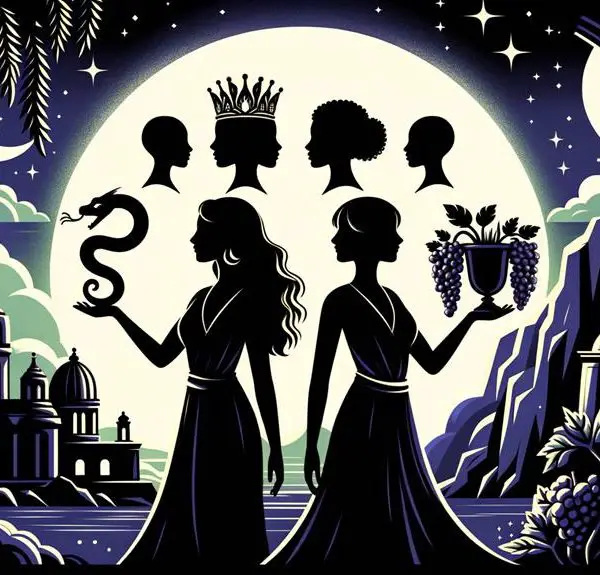

Sign up